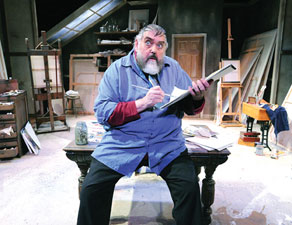
I wrote it as the caption on my Facebook page: Happiness is being slept on by a big cat.
Or something like that.
I had been planning on trying to maybe make it down to Kulak's last night for the open mic, but I fell dead asleep about 7, woke up at 11, went back to sleep 12:30, woke up at 4. My eyes hurt.
I am physically and emotionally exhausted. Both of us are. But, as I sit here writing these words, I can hear the heavenly sounds of a contented cat purring quietly next to me in the dark.
His tail is touching me, and part of a leg, which is all he'll allow for the moment. I want, of course, to snuggle up with him and roll around on the carpet, but he's not having that yet. After all, it has been a month since we've been together.
But he did sleep on Jim as they watched TV together and snored through the second episode of Dexter, which I was then awake for. Or was that Mad Men? Was it me or did they both have exhausted daddy plots? Did Don Draper turn into a serial killer? I'm so confused.
I can't tell, at this moment, whether I'm awake or asleep. But give me a few days.
I'm going to start back on all my regular health routines. Lifting my hand weights, working the camera down at Kulak's, both on camera and in the songwriting workshop where I can't tell if Im a guru or a student, and as doing much extra walking as possible. I also have a lot of music ahead of me. Two musicals (one in the workshop/writing phase, one I've taken on as a special project that involves cross-media platforms such as print and stage, plus some reunion-planning.
By reunion-planning, I mean that when Jim and I get back to New York, it will be at a time when all the TLS-LA cast and creative team (now that Maisey is on Broadway), are together in one city. It'd be cool to do something with them all.
Also, we'll be pulling together an informal staged reading of "Manhattan Clam Chowder," a new musical revue about New York that I'm doing with Jim and Amy. More info on that as we come up with a plan. Right now, we're focusing on Zero. (One of my ideas is to make all the sheet music freely available to anyone who wants to learn the songs. And then we could have a big "sing" one night in some club in the Village or something. Or is that what every songwriter wishes would happen with their songs?)
Also, as long as I'm chattering on, I'm thinking it's time for me to make a new record.
I like making all my little demos using home equipment cobbled together with the help of friends who are more tech savvy than I, but, just once more time before I die, I'd like to gather musicians around me in a studio and make a real record.
I want to play and record with great musicians. Is that so much to ask?
It's time. I'm ready and it's time.
Right after I go back to bed. The cat is starting to snore.
EDIT: I shouldn't write blog entries when I'm that tired. Now, back to not-moving.













































